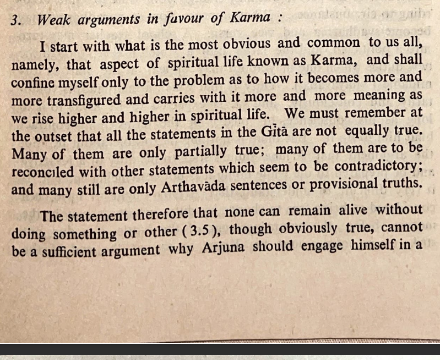I start with what is the most obvious and common to us all, namely, that aspect of spiritual life known as Karma, and shall confine myself only to the problem as to how it becomes more and more transfigured and carries with it more and more meaning as we rise higher and higher in spiritual life. We must remember at the outset that all the statements in the Gita are not equally true. Many of them are only partially true; many of them are to be reconciled with other statements which seem to be contradictory; and many still are only Arthavada sentences or provisional truths.
The statement therefore that none can remain alive without doing something or other (3.5), though obviously true, cannot be a sufficient argument why Arjuna should engage himself in a battle which he abhors. The argument that he was a Ksatriya and therefore it was his duty to fight, holds some water, no doubt; but Krsna could have waited for some time only to find Arjuna prepared again to fight on account of his being compelled by the force of his Ksātra Prakrti (3.5, 33; 18.59). If one’s own duty and one’s own ‘dharma’ were the only guiding principles of doing actions, and if resorting to ‘paradharma’ was really ‘dreadful (bhayavaha), then there was no necessity of Krsna’s advice that Arjuna should bid good-bye to all the dharmas, whether ‘svadharma’ or ‘paradharma’, and surrender unto him and be free from all sins (3.35; 18.66). And what is ‘svadharma’, even if it is understood in the sense of one’s duty? Is it determined by birth, or by the qualities and actions’ (guna-karma-vibhāgasah 4.35)? The son of a Ksatriya may be considered as a Ksatriya, and his son a Ksatriya again; and this may go on till the intermixture of castes wipes out this distinction. If at all the class- system has any value even in India, it ought to be based, as it must have been on Śri Krsna’s and Vyāsa’s authority, on the consideration of guņa and karma. Judged from this point of view, Droņācārya and Kṛpācārya ought to be considered as Kṣatriyas, so far at least as the battle of the Mahabharata was concerned. The Svadharma’ then of these two Brahmins was, at least for the time being, the same as that of Arjuna, namely, to fight and not to resort to ‘sandhya’ and the study of the Vedas. So, ‘Svadharma’ or duty is not something which sticks to a man from the cradle to the grave, but may change from time to time according to circumstances. What appears now as paradharma may become svadharma and vice versa. A school teacher may turn into a politician, and the latter into a watch-maker, though the new duties which one may adopt may appear at the start as formidable (bhayavaha). Duty is that which a man adopts voluntarily and consciously, and he is expected to be loyal to it so long as his conscience, his pledge or the terms of his contract bind him to do it. But there is nothing inexorable about it. So, the argument that Arjuna should stick to his duty of a Kṣatriya and be prepared to die while doing it is not convincing enough. Is it very difficult to understand that Arjuna ought to have been considered as being free to change his duty-whatever may be the motive-before the commencement of the battle, if it does not strike us as incongruous for Krsna to say at the end of the Bhagavadgītā, i.e. after the instruction of the Brahma-vidyā was complete, and after the Viśvarūpa was shown as annihilating the enemies, that Arjuna was free to fight or not to fight? He was the most faithful disciple of Lord Krsna. Otherwise, he would have rebutted the dilemma which Krsna had proposed for him. He could have said that if he would win the battle he would lose the heaven, and if he would be killed in the battle he would lose the Kingdom of the earth, and so, he would be the loser both ways (2.37). Besides, is it not simply a device used by Krsna to see how far Arjuna could be tempted by the words that the gates of the heavens are always open to the Ksatriyas (2.32), when, as a matter of fact, Śri Krsna himself later on says that even those who go there on account of their great merit return to this mortal world after that merit is exhausted by the enjoyment of heavenly pleasures (9.20-21)?

